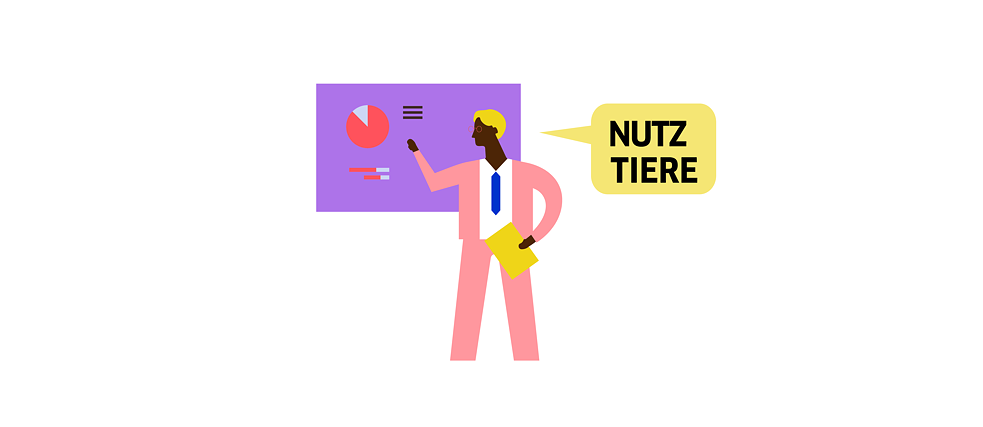Word! The Language Column
The Poetry of Other Animals

We humans exploit other animals. But can we see them from a different perspective? Our new columnist Manon Hopf is exploring the poetry of other animals.
By Manon Hopf
Many people – and I’m no exception – tend to take a rather pragmatic view of other animals – except when it comes to our cherished companion animals at home. We tend to focus on how they can be of use to humans – or how to minimize any obstacles or risks they might pose to humans and their interests. The Duden dictionary defines the German word Nutztier (lit. “useful animal”, i.e. farm animal or productive livestock) as an [other] animal used for profitable purposes by humans. I’d like to be even clearer and call humans to account: A Nutztier means another animal that humans exploit for their advantage and, invariably, to the animal’s disadvantage. A Nutztier is never a subject, it is always an object of the humans who mis/handle it.
“Nutztiere” and “Arbeitstiere”
Nutztiere are other animals that are processed into meat, for example, or whose products are processed into consumable products; the term is also used to mean Arbeitstiere (lit. “work animals”). Arbeitstiere are other animals that are used to carry out work, but in German the word is also used to refer to a person who works “like a horse”, an indefatigable “drudge”, at any rate someone who works a lot and productively, even a workaholic. Arbeit (“work”) precedes tier (“animal”), whether human or not, and increases the value of the animal because the animal renders itself – or humans render it – nützlich, i.e. “useful” to us. The German noun Nutzen means “benefit”, “profit”, “use” or “advantage” and is etymologically close to the verbs nutzen (to “use”) and geniessen (“enjoy”). These two words fuse marvellously in nutzniessen (to “benefit” or “profit”), which has a certain connotation, a slightly bitter flavour, in German, especially when used in connection with Hausfrauen (“housewives”) and Haustiere (“pets” lit. “house animals”). Housewives and pets are tied to the house, belong to this place; Arbeitstiere and Nutztiere belong to a sector of the economy – and they all have to follow orders, to obey, and to make themselves nützlich, i.e. useful.I want to try to deconstruct this dominant, domesticating (from the ancient Greek δῶμᾰ / dóma: “house”) perspective, and look at other animals poetically, with an empathic eye. What with all the meat passing through human mouths and middles, don’t tongues grow back anywhere? How can I talk about other animals, approach them with care, in my native tongue, which accords them no freedom at all? What is species-appropriate? What would be a species-appropriate language? I’d like to open up my anthropocentric vocabulary, let my tongue grow feelers …
I’ve seen other animals enjoying themselves. And playing. I’ve seen them speak, sometimes even understood them – and they me. We share certain gestures with other apes. We humans still know precious little about other animals’ languages, let alone how they use them, whether they, too, play with language and enjoy it. I think it’s not only possible, but probable: after all, other animals have evolved in parallel with us humans, together with us. Our genes are as old as the hills [the first DNA molecules replicated more than four billion years ago]. And, genetically speaking, we have far more in common with other animals than not: we share between 98 and 99 per cent of our genetic makeup with bonobos, for example, about 90 per cent with mice, cats and pigs, though only 84 per cent with dogs.
Poetic im/possibilities
Not every animal species can do everything or possesses every ability in equal measure. Nor can humans perceive everything that happens or is communicated. It has been proven that many other animals have feelings similar to ours. They feel happy, afraid or angry. They suffer, grieve, squabble and mediate disputes. They show remorse, laugh and scream. Some other animals dance, too. Feel the pain of separation. Show compassion and have relationships, circles of friends and aversions. Other animals have their own cultures. Suffer from anxiety and even obsessive-compulsive disorders, post-traumatic stress disorder and depression – for which they can be treated with psychotropic drugs just like us, because our brains work in similar ways. Many wild animals feel stressed out, even scared to death, when we’re around. And many want more or less the same things from life that we do. Other animals sing, remember, and tell stories.So I want to write about the poetry of other animals, to write from my perspective about what I am capable of perceiving and knowing, and about what else poetry could be – about poetic im/possibilities.
learn this, too, from other animals:
keep the word in your mouth
till it turns sour
then spit it out
learn from other animals:
ignore commands
be slow
refuse to work
go on strike
demand unscheduled breaks
destroy equipment
enclosures, too
throw stones
fight back
break out and run away
everything in succession or
in due course
and learn to laugh from other animals
because every joke understood
strikes a chord
makes a feint
on the tongue:
people are odd
birds
Word! The Language Column
Our column “Word!” appears every two weeks. It is dedicated to language – as a cultural and social phenomenon. How does language develop, what attitude do authors have towards “their” language, how does language shape a society? – Changing columnists – people with a professional or other connection to language – follow their personal topics for six consecutive issues.